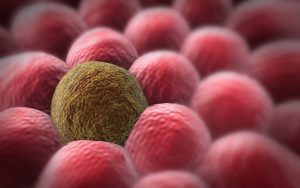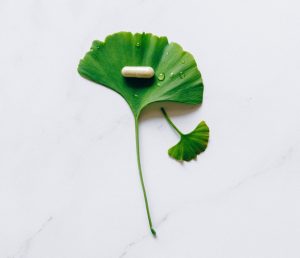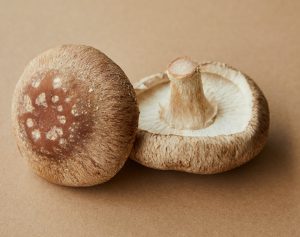Powerful Anti-Cancer Molecule Discovered Inside 5,000 Year Old “Bread Fungus”
Find out Why Scientists believe this Ancient “Goo” may be Nature’s Solution to Cancer, Diabetes, Heart Disease, and more…
More and more, we find that nature holds the key to unlocking the potential of our body and our health. And there may be nothing more exciting than the recent discovery of a 5,000 year old “goo” that may hold the key to unlocking your body’s ability to fight (and win) against cancer. That’s right…
 Scientists have locked on to a powerful healing compound called Beta Glucan. It’s a natural molecule that’s found in oats, barley, mushrooms, and even a “bread fungus” that’s been safely used by Humans for the last 5,000 years.
Scientists have locked on to a powerful healing compound called Beta Glucan. It’s a natural molecule that’s found in oats, barley, mushrooms, and even a “bread fungus” that’s been safely used by Humans for the last 5,000 years.
This simple yet powerful compound is all-natural and side effect free. And when it’s isolated, it has the power to restore your body’s innate primal immunity — significantly enhancing your immune system to help your body fight against cancer and many other diseases.
Understanding How Our Immune Systems Work
As you may already be aware, your immune system is your “coat of armor.” It’s your body’s built-in protection for everything from the common cold to cancer and is made up of two components known as innate (general) and adaptive (specialized) immunity.5
These two systems work closely together to protect us, but they handle completely different tasks.
Innate immunity refers to our general, nonspecific, and rapid defense mechanisms. Innate immune mechanisms are activated very quickly after an invading pathogen or toxin appears in our body, or if we get injured. They also respond to cancer cell formation (more on that in just a moment).
Innate immunity includes physical barriers such as our skin and mucous membranes, immune proteins including enzymes in our blood and lymph, as well as a number of first-response immune cells.5
Adaptive immunity is a much more complex, specialized, and long-term response system.
Both innate and adaptive immunity play a very important role in determining how your body deals with cancer.
How the Immune System Responds to Viruses, Cancer & More
One of the most common foreign invaders we’re all familiar with (especially these days) is viruses. As virus particles enter your body, your immune system springs into action and sends special fighting cells to surround the virus cells. If your immune system is in tip-top shape it can usually overcome these ”invaders” and you won’t get sick.
 But your immune system also has another function which many people aren’t aware of. It has to do with cleaning up and recycling old, damaged, and mutated (i.e., cancer) cells.
But your immune system also has another function which many people aren’t aware of. It has to do with cleaning up and recycling old, damaged, and mutated (i.e., cancer) cells.
In fact, it’s completely accurate to say that at any given point, every person alive has at least one (and usually far more) cancerous cells in their body.
If that’s the case, why do some people get cancer and others don’t? It has to do with the strength and vitality of your immune system. If your immune system is working well and able to clean up these mutated cells that are constantly forming (a process called phagocytosis), you stay healthy. But when your immune system slows down, these cancer cells can grow and multiply.
Unfortunately, as we get older our immune system doesn’t function as efficiently as it once did. That’s why foods, lifestyle practices, and substances that can enhance immune function – without causing any negative side effects – are so beneficial if you value your good health.
Beta Glucans and Their Role in Trained Immunity
“Trained immunity” is a term used to describe the ability of immune cells that are part of the innate immune system to store the memory of previous infections, thereby protecting us against reinfection by the same or similar pathogens.6, 7
Intriguingly, beta glucans seem to be able to induce trained immunity.7 In a laboratory experiment, a beta glucan from the yeast Candida albicans was seen to induce trained immunity in innate immune cells known as monocytes, leading to the production of various immune signaling proteins and an overall activation of the immune system.7, 8
Yeast beta glucans have also been shown to facilitate the conversion of monocytes into the more functionally advanced and long-lived macrophages. These are specialized immune cells that surround and kill invading bacteria and viruses.9 Macrophages also ingest and remove dying, dead, and abnormal cells in our body.
Can Beta Glucans Fight Cancer in Multiple Ways?

Induction of trained immunity is just one of several mechanisms by which some beta glucans trigger anti-cancer properties in immune cells.
Beta glucans are known to bind to three specific proteins, including a protein known as Dectin-1, that are present on the surface of nearly every type of immune cell.10, 11 In other words, beta glucans are the keys that open these 3 different locks to gain access to immune cells. Binding of beta glucans to these three surface receptors is believed to activate and “prime” specific immune cells to attack cancer cells.10-12
For instance, treatment with beta glucans was seen to induce trained immunity in immune blood cells known as neutrophils in mice in a laboratory experiment, leading to reduced growth of their tumors.13 What’s more, transferring these “trained” neutrophils to other mice, which had not been treated with beta glucans, was seen to slow down the growth of their tumors as well.
Train Your Immune System to Better Clear Away Cancer With Up To 50% Off the Best Anti-Cancer Beta Glucan (special offer)
How Beta Glucans Impact Tumor Growth
Tumors and the tumor microenvironment (TME), or the immediate environment around tumors, are known to constantly interact with and influence each other, profoundly influencing tumor growth.
The TME has become a key target area for anti-cancer therapy, especially immunotherapy.12
Studies show that beta glucans can manipulate various aspects of the immune system within the TME, potentially improving the clinical outcomes of anti-cancer therapies, including immunotherapies.10, 12
 For instance, macrophages in the TME are known to play an important role in cancer progression.12, 14 Pro-inflammatory, anti-cancer macrophages are known to be present in the TME during the early stages of cancer. However, for unknown reasons, they become anti-inflammatory and cancer-promoting as the tumor continues to grow over time, which has been linked to a poor cancer prognosis and patient survival.12
For instance, macrophages in the TME are known to play an important role in cancer progression.12, 14 Pro-inflammatory, anti-cancer macrophages are known to be present in the TME during the early stages of cancer. However, for unknown reasons, they become anti-inflammatory and cancer-promoting as the tumor continues to grow over time, which has been linked to a poor cancer prognosis and patient survival.12
Beta glucans have been shown to bind to the Dectin-1 receptor protein on the surface of macrophages in the TME and reprogram them back to a pro-inflammatory, anti-cancer state. Naturally, this is likely to improve both cancer prognosis and patient survival.14
Similarly, B-cells are a very important component of the adaptive immune system. Beta glucans also activate B-cells, again by binding to the Dectin-1 surface receptor, and induce the production of immune-signaling molecules, enhancing overall immune system activity.12
In other words, beta glucans are powerful, natural immunomodulators that help to fight cancer better. In fact, they are already being used as an adjuvant treatment for cancer in other countries, including Japan, Taiwan, and Korea.
3 Advantages of Beta Glucans as Immunomodulators:
- They themselves don’t trigger an immune response.
- They appear to be completely non-toxic. For instance, a dose of up to 10 mg/kg was well tolerated, with no reported adverse effects.
- They have very specific effects on our immune system, because they act on immune cells via specific surface receptors.
Other Health Benefits of Beta Glucans
 In addition to their benefits for cancer, certain types of beta glucans have been shown to reduce cholesterol levels in both laboratory experiments and human clinical trials.2,3 Daily consumption of 3 grams of beta glucans from oats and barley has been linked to significant reductions in total cholesterol, LDL cholesterol, and triglycerides – all well-known risk factors for cardiovascular disease.2, 3
In addition to their benefits for cancer, certain types of beta glucans have been shown to reduce cholesterol levels in both laboratory experiments and human clinical trials.2,3 Daily consumption of 3 grams of beta glucans from oats and barley has been linked to significant reductions in total cholesterol, LDL cholesterol, and triglycerides – all well-known risk factors for cardiovascular disease.2, 3
These findings and others led the U.S. Food and Drug Administration (FDA) to authorize the use of health claims on oat products, attributing the lowering of cardiovascular and diabetes risk to the daily consumption of at least 3 g of oat beta glucan.
When consumed as a dietary supplement, beta glucans produce gel-forming, soluble fiber in our gut. In addition to its immune-boosting and cholesterol-lowering effects, beta glucans also help to keep blood sugar within safe limits.1 They also help fecal matter retain water in the large bowel, resulting in bulky, soft, easy-to-pass stools.
To recap, in thousands of studies, beta glucans have proven beneficial for obesity-related conditions, heart health, and improving immune function. They also appear to be the ideal complement to cancer therapy. Beta glucans boost anti-cancer activity of our innate and possibly adaptive immune systems21, reduce the debilitating side effects of chemotherapy and other cancer treatments, and significantly improve quality of life and extend survival in cancer patients.22
Finding the Best Sources of Beta Glucans
 So, where can you get beta glucans? Beta glucans are found widely in nature in barley fiber, oats, and other cereal grains, and in edible mushrooms. They are also present in algae, seaweed, bacteria, yeast (including Baker’s yeast), and fungi.
So, where can you get beta glucans? Beta glucans are found widely in nature in barley fiber, oats, and other cereal grains, and in edible mushrooms. They are also present in algae, seaweed, bacteria, yeast (including Baker’s yeast), and fungi.
Different cultures have relied on different food sources of beta glucans depending on what was available to them. For instance, mushrooms have long been revered in Asian culture, whereas oats and Baker’s yeast are readily available forms of beta glucans in the United States.
Click here to find out where to get the best, most-absorbable form of Beta Glucan on the market (save up to 50% OFF)
- Understanding the Physics of Functional Fibers in the Gastrointestinal Tract: An Evidence-Based Approach to Resolving Enduring Misconceptions about Insoluble and Soluble Fiber
- Effects of yeast-derived β-glucans on blood cholesterol and macrophage functionality.
- Meta-analysis of the effect of β-glucan intake on blood cholesterol and glucose levels.
- Clinical trials of yeast-derived β-(1,3) glucan in children: effects on innate immunity
- The innate and adaptive immune systems.
- Defining trained immunity and its role in health and disease.
- Trained Immunity as an Adaptive Branch of Innate Immunity.
- Monocytes from neonates and adults have a similar capacity to adapt their cytokine production after previous exposure to BCG and β-glucan.
- Candida albicans β-Glucan Differentiates Human Monocytes Into a Specific Subset of Macrophages.
- Optimizing Tumor Microenvironment for Cancer Immunotherapy: β-Glucan-Based Nanoparticles.
- Antitumor effect of soluble β-glucan as an immune stimulant.
- Yeast-Derived β-Glucan in Cancer: Novel Uses of a Traditional Therapeutic.
- Innate Immune Training of Granulopoiesis Promotes Anti-tumor Activity.
- Dectin-1 Activation by a Natural Product β-Glucan Converts Immunosuppressive Macrophages into an M1-like Phenotype.
- Memorial Sloan Kettering Cancer Center: Shiitake mushroom.
- Memorial Sloan Kettering Cancer Center: Lentinan.
- Giant Krukenberg tumor from a perforated gastric cancer that was successfully removed after multidisciplinary therapy: report of a case.
- The use of lentinan for treating gastric cancer.
- Clinical efficacy of superfine dispersed lentinan (beta-1,3-glucan) in patients with hepatocellular carcinoma.
- Shiitake Mushroom: Gourmet Ingredient or Medicinal Powerhouse?
- Immunomodulation with β-glucan from Pleurotus ostreatus in patients with endocrine-dependent breast cancer.
- β‑glucan vaccine adjuvant approach for cancer treatment through immune enhancement (B‑VACCIEN) in specific immunocompromised populations (Review).
Copyright © 2025 Conquering Cancer. All Rights Reserved.